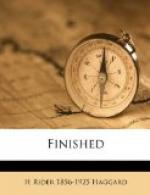This was what happened to us, among whom were men of the 24th, Natal Carabineers and Mounted Police. Some had dismounted, but I sat on my horse, which stood quite still, I think from fright, and fired away so long as I had any ammunition. With my very last cartridge I killed the Captain Indudu who had been in charge of the escort that conducted me to the Tugela. He had caught sight of me and called out—
“Now, Macumazahn, I will cut you up nicely as I promised.”
He got no further in his speech, for at that moment I sent an Express bullet through him and his tall, melancholy figure doubled up and collapsed.
All this while Colonel Durnford had been behaving as a British officer should do. Scorning to attempt flight, whenever I looked round I caught sight of his tall form, easy to recognize by the long fair moustaches and his arm in a sling, moving to and fro encouraging us to stand firm and die like men. Then suddenly I saw a Kaffir, who carried a big old smooth-bore gun, aim at him from a distance of about twenty yards, and fire. He went down, as I believe dead, and that was the end of a very gallant officer and gentleman whose military memory has in my opinion been most unjustly attacked. The real blame for that disaster does not rest upon the shoulders of either Colonel Durnford or Colonel Pulleine.
After this things grew very awful. Some fled, but the most stood and died where they were. Oddly enough during all this time I was never touched. Men fell to my right and left and in front of me; bullets and assegais whizzed past me, yet I remained quite unhurt. It was as though some Power protected me, which no doubt it did.
At length when nearly all had fallen and I had nothing left to defend myself with except my revolver, I made up my mind that it was time to go. My first impulse was to ride for the river nine miles away. Looking behind me I saw that the rough road was full of Zulus hunting down those who tried to escape. Still I thought I would try it, when suddenly there flashed across my brain the saying of whoever it was that personated Mameena in the Valley of Bones, to the effect that in the great rout of the battle I was not to join the flying but to set my face towards Ulundi and that if I did so I should be protected and no harm would come to me. I knew that all this prophecy was but a vain thing fondly imagined, although it was true that the battle and the rout had come. And yet I acted on it—why Heaven knows alone.
Setting the spurs to my horse I galloped off past Isandhlwana Mount, on the southern slopes of which a body of the 24th were still fighting their last fight, and heading for the Nqutu Range. The plain was full of Zulus, reserves running up; also to the right of me the Ulundi and Gikazi divisions were streaming forward. These, or some of them, formed the left horn of the impi, but owing to the unprepared nature of the Zulu battle, for it must always be remembered that they did not mean to fight that day, their advance had been delayed until it was too late for them entirely to enclose the camp. Thus the road, if it can so be called, to Fugitives’ Drift was left open for a while, and by it some effected their escape. It was this horn, or part of it, that afterwards moved on and attacked Rorke’s Drift, with results disastrous to itself.




